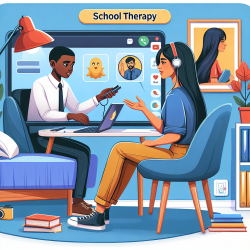Introduction
As speech-language pathologists, our focus often lies in the realm of communication disorders, but the interconnectedness of health domains cannot be overlooked. The study titled "Early Childhood Junk Food Consumption, Severe Dental Caries, and Undernutrition: A Mixed-Methods Study from Mumbai, India" provides valuable insights that can enhance our practice by highlighting the relationship between oral health and nutrition, particularly in early childhood. This blog explores how these findings can be integrated into our practice to improve outcomes for children.
Understanding the Study
The study conducted in Mumbai, India, utilized a mixed-methods approach to investigate the prevalence of early childhood caries (ECC) and its association with undernutrition in low-income communities. The quantitative data revealed that over 50% of children consumed junk food and sugary tea daily, with 50% experiencing ECC. The qualitative data underscored the challenges families face in maintaining oral health, such as easy access to junk food and limited dental care.
Implications for Speech-Language Pathologists
Speech-language pathologists (SLPs) can play a crucial role in addressing the issues highlighted in this study. Here are some strategies to consider:
- Holistic Assessment: During evaluations, consider including questions about dietary habits and oral health. Understanding a child's nutrition and oral health can provide a more comprehensive view of their overall well-being.
- Interdisciplinary Collaboration: Collaborate with nutritionists, dentists, and pediatricians to develop integrated care plans. This approach ensures that children receive comprehensive care addressing both communication and health needs.
- Parental Education: Educate parents about the impact of nutrition and oral health on speech and language development. Providing resources and strategies for healthier dietary choices can empower families to make informed decisions.
- Advocacy for Policy Change: Advocate for policies that limit junk food marketing and promote access to affordable dental care. SLPs can be powerful voices in advocating for systemic changes that benefit children's health.
Encouraging Further Research
The study highlights the need for further research to explore the causal relationships between ECC, nutrition, and speech-language development. Future studies could investigate how poor oral health and nutrition impact speech and language outcomes, providing a stronger evidence base for integrated interventions.
Conclusion
Integrating insights from this study into our practice can enhance the care we provide as speech-language pathologists. By addressing the broader health context of our clients, we can contribute to better communication outcomes and overall well-being. For those interested in delving deeper into the research, the original study can be accessed here.










